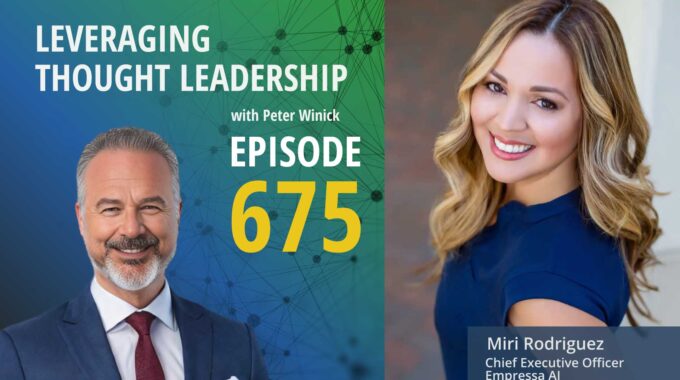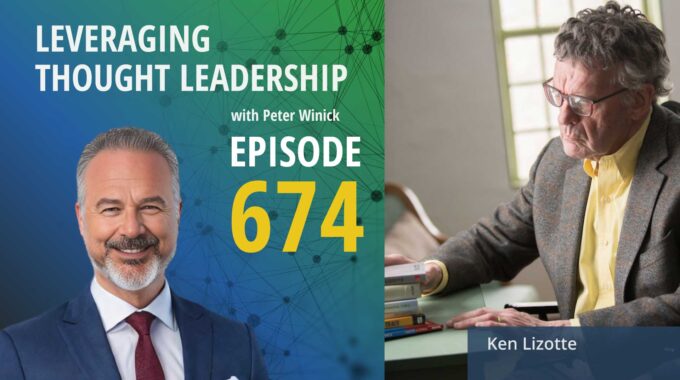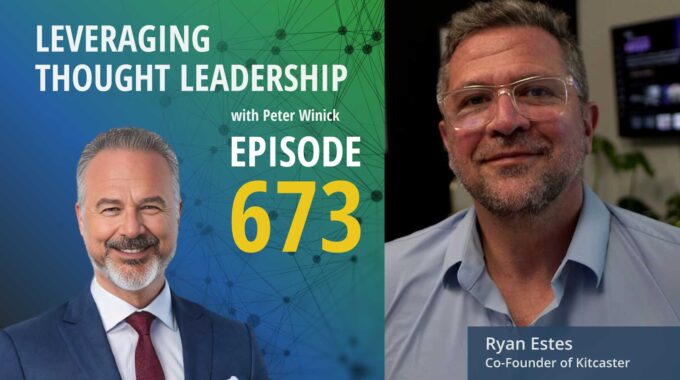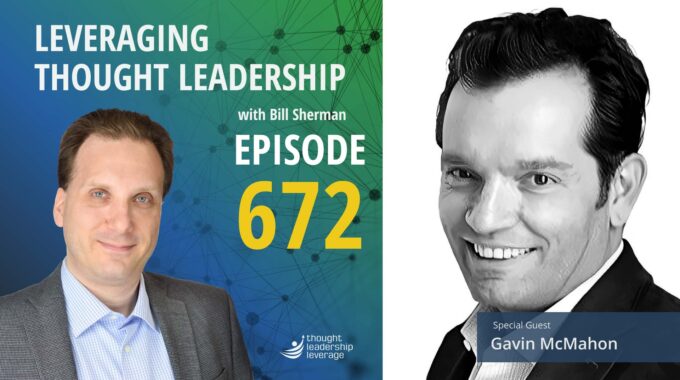Building Brand Love Through Storytelling This episode explores how storytelling can drive inclusion, purpose, and…
Turn Ideas into Influence—and Influence into Capital | Nick Cooney
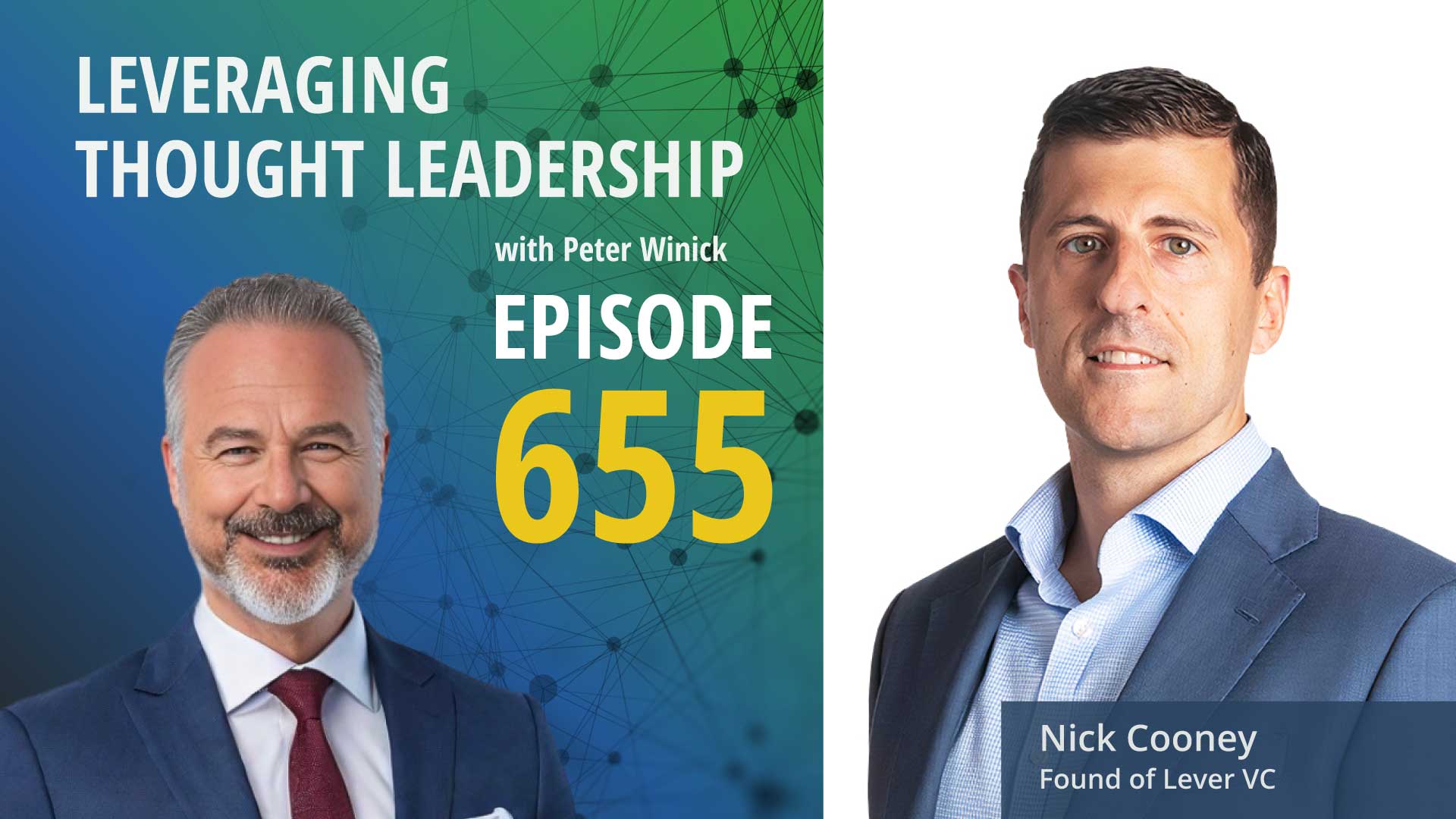
How Strategic Content Fuels Growth in Purpose-Led Ventures
This episode explores how thought leadership can align purpose with performance. Learn how strategic content builds credibility, attracts the right investors, and drives measurable impact—both in business and in doing good.
Can doing good in the world be quantified like ROI?
Peter Winick sits down with Nick Cooney, founder and managing partner of Lever VC, to explore how a venture capitalist measures moral return alongside financial return. Nick’s not your typical VC—he’s also the author of “What We Don’t Do: Inaction in the Face of Suffering and the Drive to Do More”, a book that fuses analytical thinking with a deep commitment to reducing suffering.
Nick reveals how dictating thoughts during a long car ride led to a full-fledged book deal with Simon & Schuster. But this isn’t just a passion project—it’s a strategic move. Nick shares how writing the book expands his credibility with mission-driven founders and impact-minded investors.
You’ll hear how he uses the “Brady Rule”—a nod to NFL legend Tom Brady—to challenge philanthropists to pursue giving with the same intensity as professional athletes pursue greatness. And how the overlap between financial rigor and moral responsibility creates a powerful (and rare) kind of leader.
Peter and Nick dive into the strategic value of thought leadership for VCs: from deal flow to LP trust, to long-game positioning. Plus, Nick shares what he’s learned from marketing the book, why the publishing timeline misses the mark, and what feedback surprised him most.
This is a conversation for anyone looking to align meaning with metrics—and use content to drive serious business outcomes.
Three Key Takeaways
Thought Leadership Can Power Business Strategy: Nick’s book isn’t just a personal project—it’s a tool to build credibility, drive deal flow, and attract like-minded investors and founders. A well-positioned book can serve as your most powerful business card.
Impact and Analytics Aren’t Mutually Exclusive: Nick bridges the gap between rigorous financial thinking and doing good. He argues that applying ROI-based decision-making to philanthropy and impact can dramatically increase the effectiveness of our efforts to reduce suffering.
You Can—and Should—Train for Good Like an Athlete: One standout idea from Nick’s book is the “Brady Rule”—a call for people to approach doing good in the world with the same intensity, discipline, and optimization mindset as elite athletes do their sport.
If Nick Cooney’s episode got you thinking about how doing good can be measured, optimized, and scaled—then you’ll want to dive into our conversation with Dr. Moshe Engelberg. Like Nick, Moshe challenges traditional business thinking by bringing purpose and values into the spotlight. In his episode, we explore how love—yes, love—can be a strategic business advantage, driving both culture and performance. Both Nick and Moshe offer bold frameworks for leaders who want to align their success with meaningful impact. If you’re rethinking ROI to include humanity, ethics, and long-term value, this is the perfect next listen:  Love from Thought Leadership with Moshe Engelberg
Love from Thought Leadership with Moshe Engelberg
Transcript
Peter Winick And welcome, welcome, welcome. This is Peter Winick. I’m the founder and CEO at Thought Leadership Leverage, and you’re joining us on the podcast, which is Leveraging Thought Leadership. Today, my guest is Nick Cooney. He is the author of What We Don’t Do, An Action in the Face of Suffering and The Drive to Do More. He is founder and managing partner of Lever VC. He was a co-founder and chairman of the board of the Good Food Institute and has done some really. Interesting things over his fairly, fairly long career. So welcome aboard, Nick, how are you? Thanks so much, Peter, I’m good and appreciate you having me on. So let me guess, so you’re a busy VC, you got a lot going on and you said. I’ve got too much time. I think I’ll just write a book because that’s a good way to kill some time. That’s how this happened.
Nick Cooney Exactly right. No, actually, it was something I wanted to write about for a while, challenges exactly as you mentioned, having the time to do it. And so the start of it was actually during COVID, driving back from my parents-in-law’s house in Chicago to where I live in the greater New York City area, long kind of 12, 13 hour car ride, had a dog in the car next to me, but it was just me. And so just started dictating into a recording on my phone. The general thoughts, ideas, some of the things I wanted to cover. And most of that didn’t ultimately make it into the book, at least not directly, but at least it got the ball flowing. And from there it was vacation days, weekend days, things like that as I could. So it took some time because indeed things, things are always busy, but eventually got to the finish line.
Peter Winick And what was the, so I liked that process. That’s kind of an interesting process. What was the whole, right? So, so the book is done. And as we all know, writing a book is a monumental task, right. But usually it could be an intrinsic motivation. It could be a financial motivation. It could, I got to get this message out. What, what was.
Nick Cooney So I think there’s, there’s two drivers. I mean, both of them have the same end goal in mind, but both ultimately lean to the same angle, but like one in the short term, one a little bit longer. So in the shorter term, like to the very general question of what do I hope people get out of the book? Or like, why did I write it in the, again, the short-term perspective? You know, I, my background spans both working in straddles, both working in finance, running a venture capital fund, thinking very analytically about finance, investments, et cetera. Uh, return on investment and then this desire to reduce suffering in the world, do good in the end world. And the book is really a combination of the two of those things in the sense of taking that analytical numbers, ROI type of mindset and applying it to doing good in world and, and also as part of that, thinking about the huge amount of good that could be done if we take action and then the flip side of that the harms that happened when we don’t take action. So the book came out of that overlap of interests and work errors of mine. And the short-term goal in the book is to, my hope is others see things the way I see them or that they recognize in what I’m writing about here, a reality of the world that we live in and from that get a desire to, to do more good in the world themselves, to give more of their money, time, energy, things along those lines. So that’s sort of the short term goal of if somebody picks up the book and reads it, that’s the message I hope that they absorb and the way that they improve their life.
Peter Winick But I would argue that if I were to stop 10 people on the street and say, describe to me the attributes of a VC, the do good stuff probably wouldn’t make it into the top 50 attributes for most VC, not that they’re bad people, that they are evil people, but it’s about the things that you led with, the ROI, the return on investment, the analytical skills, et cetera. So is this sort of in the genre of like a measure what matters, John Doar’s book, or Is a little bit of both because what you, I mean, you’re trying to do good. And I think a lot of times what happens is the do good food folks are almost too altruistic and they don’t want to measure things because they don’t want to be held to that account or it’s just not how they’re wired. So I kind of like that crossover.
Nick Cooney Absolutely. I mean, one thing I often think about is if you think of the Venn diagram of people that think very analytically are very focused on success and achieving quantified success in whatever domain. So VC finance could be one domain, but it could be athletes being, beating their personal best or anything else that can be quantified. You think about those sort of people who are really motivated to achieve specific numbers and just move those numbers up and up and dollars in the bank or anything And then you think about that group of people that want to help those who are in need, want to make the world a better place. The overlap of those two circles is pretty small. But I think it’s in the overlap of the two circles that you have that any of us as individuals have the power to have really, really big impact. So my goal with the book in part is to reach people who are in that first camp are used to thinking analytically and try to get them to help them to and inspire them to think that way about the good they can do in the world.
Peter Winick So move this into the VC world. Does it also serve as a vehicle to sort of elevate your brand and, or help with deal flow and the self-selection components? Cause I would imagine if I read your book, I kind of know where your head space is at and what you’re about. And if I’m looking for an investor, it would be kind of cool if they were aligned with my way of thinking, if it aligned with yours, is that a fair?
Nick Cooney It is absolutely. And for our funds, so Lever VC, the investment fund I run, we are a returns driven fund, it’s not an impact fund. We’re focused on food and ag tech space and specifically sub-sectors there that do have a positive impact. So we focus on sectors that have a positive impact, but we’re a returns-driven fund. That being said, we certainly have a number of investors that invest with us and certainly the large majority of founders in the categories that we invest into. Um, who are mission or impact driven for one reason or another. It could be improving the healthiness of food. It could improving sustainability in ag and so forth. And so, so yes, absolutely. I mean, that someone told me once years ago that a book is the best business card you could have. And I think there’s definitely an element, a strong element of truth to that. So like it’s certainly from a benefit to the fund perspective, it certainly adds some increased credibility. It certainly helps those sort of parties for whom this way of Is a plus and is a good thing, makes clear to them, at least for me as one of the partners in the fund, how I think about the world and trying to do good in the world while to do have positive impacts in the word while also doing well financially.
Peter Winick So the other side, you know, I mentioned the deal flow, meaning folks needing funding for their businesses, but also it makes a statement and puts up a set of ethos or a set of principles to investors, right? You have to raise money for the fund. Does it, does it work on that side of the coin as well? Yes, I think it does.
Nick Cooney Say for at least some of them, you know, I think there’s some that care nothing whatsoever about impact or like positive impacts in the world at all. And that’s fine. And that is really the majority of our LPs more or less. But then there’s, some portion that do care about impact. They’re investing either to reduce climate related goals, improving food system related goals or similar. And so for that subset of our LP is, and you’re right, I mean, we’re actively raising our funds to right now. So this is a very real present topic. It is helpful. It’s, it’s a, it is a credibility booster to have a book from a publisher like Simon and Truster and Regalo press to have the book that’s done pretty well on Amazon and its categories. Uh, and just to have, a book in general that goes into this topic. It can be helpful for those types of LPs for sure. From a credibility.
Peter Winick You’ve been able to compare the book, however you just find the book. It’s not just the writing of the book but the ancillary things and stuff. The book as it relates to the marketing and impact and ROI on both the investor side and the deal slide to give you been able say, ah, these five LPs, I wouldn’t have gotten if we didn’t have the book and these five deals or how have you been to track that? So I’m guessing you’re a track guy.
Nick Cooney Yeah, yeah. So it’s very early. I mean, as we’re recording this, the book came out two weeks ago. So I think it’s too soon to be able to track that. I would say that this is the first book I’ve written in 10 years, but when I wrote the last book, that very directly led to my entry into starting to work in the VC side, which was helping a family office set up a private vehicle focused on investments in certain categories. And I think that probably would not have happened or there’s a strong chance that would not have happened without the first book. So, or that book from 10 years ago. So this one’s new, but that experience, I’ve already gone through that experience of write a book, get it out there to folks that matter, and it brings up conversations that lead to some really, really great financial and career opportunities without a doubt.
Peter Winick And if you’re enjoying this episode of Leveraging Thought Leadership, please make sure to subscribe if you’d like to help spread the word about our podcast. Please leave a five-star review at ratethispodcast.com forward slash LTL and share it with your friends. We’re available on Apple Podcasts and on all major listening apps as well as at thoughtleadershipleverage.com forward slash podcast.
Peter Winick Got it. And I would also imagine that you’re less worried about the short term of the book, meaning the way the publishing world and then I call it the sort of book industrial complex thinks is two months before release, release and 90 days after that’s kind of where 96% of the energy goes. But I would imagine you’re playing the long game here. Like this book has a no pun intended, you know, shelf life of five, seven, 10 years or something like that.
Nick Cooney Yes, absolutely. I mean, for the sake of the book’s general financial success and the, based on my commitment to the publisher, I’m certainly playing the short game as well, right? So certainly trying to do everything I can, but absolutely. I mean this is not a book about some topic that’s in the news now and will be gone nine months from now. It’s a perennial topic and they certainly the goal and expectation is the book both is able to keep selling for many years, but also delivers a lot of career value relationship unlocks, opportunity unlocks for many years.
Peter Winick And are there any other pursuits that you have relative to the thought leadership? So what I mean by this is the book is just one place your ideas live, right? It forced you and the dog had to listen to it, right, to sort of get your thoughts tied and put it together. And now it lives in a book where you could do other things with it. Do you have other plans in terms of derivatives or offerings or?
Nick Cooney I do, I do. So in the couple prior books I wrote, while they’re not on exactly the same topic, like this new book, all of the books I’ve written have to do with this, generally with being better, how we can be better at charitable or philanthropic efforts. And so in terms of this new one, what we don’t do and how that can be, that sort of content get out there more and be further leveraged. Yeah, so I don’t, you know, I’d say this is sort of a half form plan at this point, but I am active in the nonprofit world as well. Both from founding and sitting on the board of a foundation or two currently, but also giving. And I plan to do a lot more in that area in the next couple of years. And so the book is, and this is to your earlier question, one of the longer-term goals, also to help open up some opportunities to be able to do more in this space, specifically helping others who want to give and want to be smart about their giving to do so effectively.
Peter Winick So part of this really is, you know, your target market really, it’s either investors or companies to fund, but the book could, could really be a way to evangelize these ideas against the broader side of the population that don’t fit into the first two, because why not? Like it’s good for, you might not quote profit from it other than a couple of dollars in the book, but like the role of the author is the evangelist, I find an interesting one, not in the religious sense, but.
Nick Cooney I think that’s right. And I think it also opens parallel opportunities. So for example, with investment work, we work with a range of companies, family offices, institutions, et cetera, they’re looking to make a return. And most of the money goes to that nearly all their money goes to that, but many of them also have charitable things they do as well. So if, you know, we as a firm over time can provide a more diverse range of offerings to the, to those sort of entities and individuals and so forth, including the philanthropic area. Great, it’s another opportunity and an area where we can provide real value to them, I think.
Peter Winick Got it. Anything on the, you know, cause you’re in that, that phase now, given the book, as we’re, as we were speaking today, he’s only had a couple of weeks. Any creative slash interesting slash different things you’re going to try from a marketing standpoint, because books are really hard, right? Like, yeah, writing it as hard as that is, that’s the easy part, but actually getting people to buy the book and then, you know, maybe even consider reading it. That’s really, really hard.
Nick Cooney Yeah, absolutely. So the book’s gotten off to a good start. So in the couple of weeks around launch, it was within Amazon, number one in its category. So number one, in charity and philanthropy, number one in social philosophy, number one in ethics and morality, which is great. I mean, we’re not talking New York Times bestseller or anything like that, right? But like decent start. So for me, the question now, as we’re chatting is, okay, how to take it from here to a much broader audience. Still in the early days, I mean, there’s nothing that’s, that’s there’s been no home runs yet in terms of doing that. So it’s definitely a work in progress. You know, I tried a interesting, little somewhat gimmicky thing. I mean it was completely true, but a somewhat gimmick PR angle of I will donate a hundred dollars for every copy of the book, every pre-order of the book up until the, the week it was launched to the point of bankruptcy. I literally, literally give away all of my liquid wealth. If enough people buy the book. I got some orders for sure. And I’m donating accordingly. Didn’t turn into some viral video on Instagram or anything like that, or get any real news pick up. But it could have been.
Peter Winick A follow-up book to that about, you know, the successful homeless author, right? There you go. There you.
Nick Cooney But trying to think outside of the box. I mean, doing the range of things that all authors do, with some media pitches, op-eds, those sort of things. Have some other ideas for the months ahead, but yeah, we’re kind of still early in that process. So, not fun once one or two of those things will end up breaking through in the months to come.
Peter Winick And, you know, as we start to wrap any final thought, because this, I always find interesting in that sometimes, you know, someone’s getting ready to launch the book and like, these are the three things that I think this is what people are going to love about the book. A, B and C, right? This model chapter five, whatever, whatever and whatever. And then you’re surprised and it’s like, no, actually it was like three throwaway sentences in chapter nine that almost didn’t make it into the book that seemed to be sticking any of that kind of feedback yet.
Nick Cooney A little bit and it’s in against very early. So, you know, I’ve only heard back from a handful of people that have read it so far since it just came out, but, but yes, there’s definitely a psych. For example, there is one particular chapter in the book, which basically encourages people who, any of us who want to try to do good, do more good in the world, to think like an athlete and incorporate the mindset. As I call it the Brady rule from former NFL quarterback, Tom Brady, right? Fantastically famous work ethic of really optimizing his life and everything around being the best he could be. And so I, I use that analogy to, okay, we should, if you want to do good in the world, take it as seriously and optimize your life and decisions around that as much as Brady did throwing a football better, then I walked through examples of that and anyway, it’s, it’d one chapter of the book. It’s not the core thesis of the books, but it’s an example chapter of how to kind of take the key lesson and put it into practice. And that’s one that a bunch of people have flagged as, oh, this is my favorite chapter. I really like that in particular. So yeah, it’s not what I would have guessed, but it is interesting and hopefully there’s some good things that can come on the back of that.
Peter Winick It’s interesting because we’re living in the world that we’re able to optimize our sleep and our steps and our oxygen levels and all this other stuff. And I think tradition, well, not traditionally, historically, the, you know, the quote best philanthropist are the ones that gave the biggest and had their names on a hospital building or whatever, which means that that’s not an aspiration for most and could be an aspiration. It’s not pragmatic. But how can I be the best giver is kind of the same. But how could I be? The best runner or best whatever sport it is. Based on my limitations, but my reality, right? So that’s an interesting way to think about it.
Nick Cooney Yeah, totally agree. And even before actually executing that, there’s just the question of, should we approach charity in that way? Should some of us, those who can’t approach charity or philanthropy in that right, we’re very used to the idea of people being willing to sacrifice their life for the common good, i.e. Be a soldier and go to war or be a firefighter or something like that, to giving our lives to help children, like so parents in poor countries working in sweatshops all day so their kids can go to high school. That’s very common. But the idea of self-sacrifice. To help others, like through charitable methods to help others. The idea of putting in the sort of work ethic there that again, professional athlete might put in an investment banker might put it in, etc. That’s not typically, it’s not typically done. And so I wanted to talk about that in the book and just give that as a model of hey, it would make sense to do all those other things for the common good. If it makes sense to put in that work ethic to succeed at a career or a sport or a hobby, it certainly makes sense do the same when it comes to saving the lives and improving the lives of others.
Peter Winick Fantastic. Well, this has been great. I appreciate your time, Nick, and thank you for sharing your story and the journey so far relative to where you’re going. So thanks so much. Appreciate it.
Nick Cooney Thank you, Peter.
Peter Winick To learn more about Thought Leadership Leverage, please visit our website at ThoughtLeadershipLeverage.com. To reach me directly, feel free to email me at peter at Thought Leadership leverage.com and please subscribe to Leveraging Thought Leadership on iTunes or your favorite podcast app to get your weekly episode automatically.


